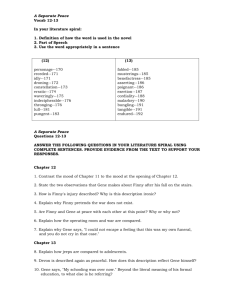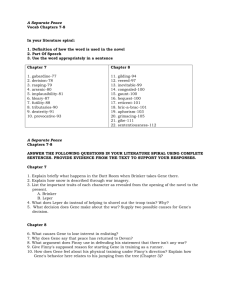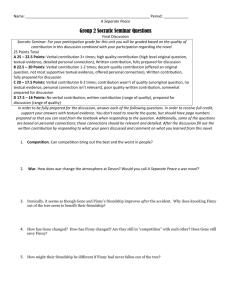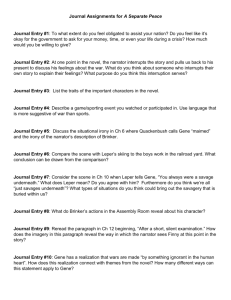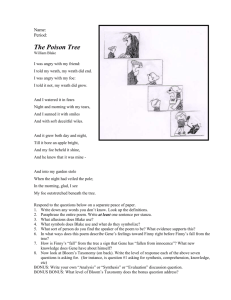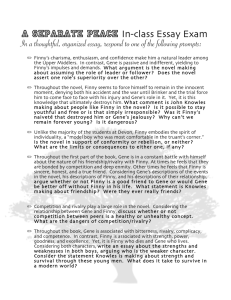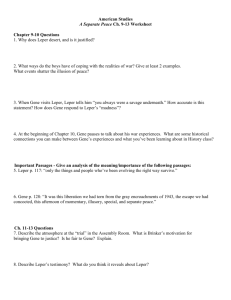A SEPARATE PEACE
advertisement
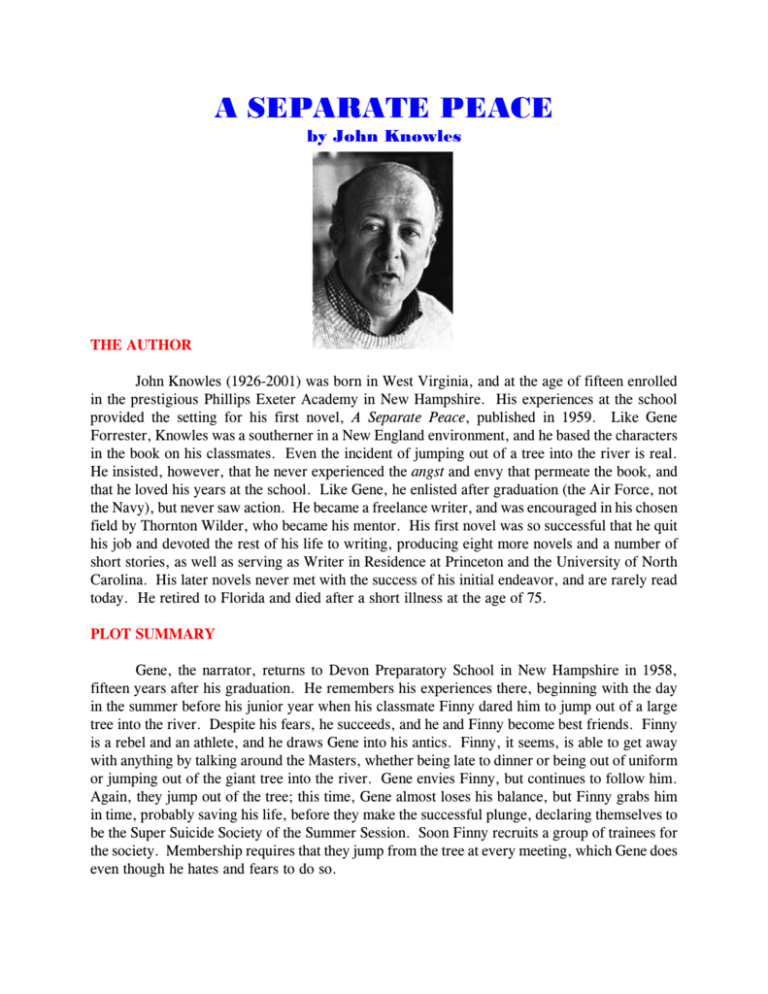
A SEPARATE PEACE by John Knowles THE AUTHOR John Knowles (1926-2001) was born in West Virginia, and at the age of fifteen enrolled in the prestigious Phillips Exeter Academy in New Hampshire. His experiences at the school provided the setting for his first novel, A Separate Peace, published in 1959. Like Gene Forrester, Knowles was a southerner in a New England environment, and he based the characters in the book on his classmates. Even the incident of jumping out of a tree into the river is real. He insisted, however, that he never experienced the angst and envy that permeate the book, and that he loved his years at the school. Like Gene, he enlisted after graduation (the Air Force, not the Navy), but never saw action. He became a freelance writer, and was encouraged in his chosen field by Thornton Wilder, who became his mentor. His first novel was so successful that he quit his job and devoted the rest of his life to writing, producing eight more novels and a number of short stories, as well as serving as Writer in Residence at Princeton and the University of North Carolina. His later novels never met with the success of his initial endeavor, and are rarely read today. He retired to Florida and died after a short illness at the age of 75. PLOT SUMMARY Gene, the narrator, returns to Devon Preparatory School in New Hampshire in 1958, fifteen years after his graduation. He remembers his experiences there, beginning with the day in the summer before his junior year when his classmate Finny dared him to jump out of a large tree into the river. Despite his fears, he succeeds, and he and Finny become best friends. Finny is a rebel and an athlete, and he draws Gene into his antics. Finny, it seems, is able to get away with anything by talking around the Masters, whether being late to dinner or being out of uniform or jumping out of the giant tree into the river. Gene envies Finny, but continues to follow him. Again, they jump out of the tree; this time, Gene almost loses his balance, but Finny grabs him in time, probably saving his life, before they make the successful plunge, declaring themselves to be the Super Suicide Society of the Summer Session. Soon Finny recruits a group of trainees for the society. Membership requires that they jump from the tree at every meeting, which Gene does even though he hates and fears to do so. As the summer progresses, Finny invents a new game - blitzball - for which he also makes up the rules as he goes along, naturally to his own advantage. One day, Finny decides he is going to break the school record in the 100-meter freestyle swim. He succeeds on his first try, but will not allow Gene to tell anyone he has done it. A few days later, he suggests that he and Gene sneak away and go to the beach on their bicycles. After spending the night on the beach, they return just in time for Gene to fail his Trigonometry test - the first test he ever failed. Over the following weeks, he becomes convinced that Finny is deliberately occupying his time in order to ruin his grades, so that, while Finny is clearly the best athlete on campus, Gene could not achieve the rank of top student. Gene redoubles his efforts and moves toward the top of the class. One day, Finny sincerely expresses his desire to see Gene do his best in his studies, and Gene realizes the jealousy he had ascribed to Finny was false. That night, they go out to jump from the tree, and Gene jostles the branch so that Finny loses his balance and crashes to the ground below, shattering his leg. A few days later, Gene hears that, while Finny will eventually walk, he will never play sports again. Gene thinks that finny suspects that he caused the fall, tries to confess it to him, but cannot. After a month’s vacation at home, Gene visits Finny at his house and admits to causing the accident, but Finny refuses to believe him. Gene returns for his senior year while Finny is still recuperating at home, but the crowded campus just doesn’t feel the same as the openness and freedom of the summer session. Since everyone is required to be involved in sports, he decides to be assistant crew manager, a job of thankless drudgery. The crew manager, Quackenbush, who is universally despised, treats Gene badly, and the two fight, after which Quackenbush tells him never to return to the crew. Later in the day Finny calls to ask about the first day of school; when he hears about the crew incident, he insist that, if he can no longer play sports, Gene must play them for him. Gene also has taken to dressing like Finny in his absence. Brinker Hadley, the “big man on campus,” sees that Gene has the dorm room to himself and jokingly accuses him of pushing Finny off the limb in order to arrange it. Gene laughs it off, but feels the jest acutely. The two then go down to the smoking room in the basement, where the joking continues. One day a group of the boys go to clear snow off a nearby railroad yard as a service project to help the war effort. At the end of the day, Brinker announces that he intends to enlist immediately. By the time Gene gets back to his room, he has determined to do the same - until he opens the door and finds that Finny has returned. Finny moves about on crutches, and struggles with the snow-and-ice-covered campus. When he hears that Gene is considering enlisting, he objects, and Gene comes to the realization that in some strange way, his friend needs him. Gene changes his mind about enlisting, and Brinker, unwilling to act by himself, does the same. In the days that follow, the Gene and Finny become increasingly dependent on one another. Finny supervises Gene’s training, insisting that they are preparing him for the 1944 Olympics (which did not happen because of the war), while Gene helps Finny with his studies; both make surprising progress. Meanwhile, Finny often insists to Gene that there really is no war, that it is nothing but a plot by a group of fat old men to keep the young in their place while they enjoy all the good things that are being rationed for the rest of the population. Late in the winter of 1943, Leper Lepellier enlists in the ski corps after seeing a recruitment film at Devon. At first the other boys joke about it, seeing poor incompetent Leper as the real cause of all the war news that reaches them. As winter grows stale, Finny instigates the other boys to organize a winter carnival, which provides an opportunity for all manner of foolishness and pranks. The carnival is broken up quickly, however, when Gene gets a telegram from Leper saying that he has “escaped” and needs help. Gene quickly goes to Leper’s Vermont home and finds that he has run away from the army after a nervous breakdown; Gene is fearful that the army will someday do the same thing to him (at this time we discover that Gene never did get into the war, but only wound up being shuffled from base to base in its closing days; he is convinced that his life was saved by the atomic bomb). When Gene returns to Devon, he finds the boys engaged in a snowball fight organized by Finny. When they ask him about Leper, he finally admits the truth, and Finny soberly drops his fantasy about the non-existence of the war. One day when Gene is helping Finny study Latin, Finny mentions that he has seen Leper Lepellier - that he has returned to campus. That night, Brinker comes into the room and insists that Finny and Gene accompany him. He takes them to the Assembly Room, a dark and foreboding place used for formal occasions. When they arrive, they find that Brinker has gathered the seniors to perform an inquisition into Finny’s accident. Finny insists that Gene was on the ground when it happened, but then Leper is brought in. He was an eyewitness, and speaks about both Gene and Finny being in the tree, and one boy shaking the limb while the other one fell. When asked who moved first, however, Leper refuses to answer and goes off into one of his mad raves. Finny, still wanting to protect Gene and unwilling to believe what he must know really occurred, stomps out of the room. The next sound that is heard is that of Finny falling down the marble steps outside the Assembly Room. The boys quickly get help, and Finny is taken to the infirmary. Gene visits him the next day and Finny tells him that he believes the incident in the tree did not stem from any personal animosity. But when Dr. Stanpole operates that afternoon to set Finny’s re-broken leg, particles of bone marrow escape into his bloodstream, enter his heart, and kill him. After Finny’s death, his influence lingers in Gene’s life. When he graduates he enlists in the Navy, but never sees active duty. MAJOR CHARACTERS • Gene Forrester - The protagonist and narrator, he comes of age during his experience at a New Hampshire prep school. • Phineas (Finny) - Gene’s best friend and antagonist, he is good at everything physical and has a talent for getting others to do what he wants them to do. Gene has a love/hate relationship with him, and is indirectly responsible for his death when he causes him to fall out of a large tree and break his leg. • Elwin (Leper) Lepellier - A gentle, nature-loving, but incompetent classmate of Gene and Finny, he enlists in the army’s ski corps, but soon runs away after having a nervous breakdown. • Brinker Hadley - “Big man on campus” at Devon, he seems to be involved in everything, but is not as independent as he would like people to think. He decides to enlist in the army, but changes his mind after Gene refuses to enlist with him. He organizes the “trial” after which Finny falls down the steps, leading to his death. • Cliff Quackenbush - The unpopular manager of the crew team, he bullies Gene when he signs up to be his assistant. • Chet Douglass - The class “brain” and Gene’s main rival for valedictorian. He loves learning for its own sake, and also plays the trumpet. • Mr. Patch-Withers - The substitute headmaster during the summer session, he is lenient and lets the boys do almost anything they want. • Dr. Stanpole - The doctor who cares for Finny after his two falls; he performs the surgery during which Finny dies. NOTABLE QUOTATIONS “Looking back now across fifteen years, I could see with great clarity the fear I had lived in, which must mean that in the interval I had succeeded in a very important undertaking: I must have made my escape from it.” (Gene, ch.1, p.6) “This was the tree, and it seemed to me standing there to resemble those men, the giants of your childhood, whom you encounter years later and find that they are not merely smaller in relation to your growth, but that they are absolutely smaller, shrunken by age. In this double demotion the old giants have become pigmies while you were looking the other way.” (Gene, ch.1, p.11) “What was I doing here anyway? Why did I let Finny talk me into stupid things like this? Was he getting some kind of hold over me?” (Gene, ch.1, p.15) “Finny always said what he happened to be thinking, and if this stunned people then he was surprised.” (Gene, ch.2, p.23) “We reminded them of what peace was like, of lives which were not bound up with destruction.” (Gene, ch.2, p.25) “I couldn’t help envying him that a little, which was perfectly normal. There was no harm in envying even your best friend a little.” (Gene, ch.2, p.26) “This time he wasn’t going to get away with it. I could feel myself becoming unexpectedly excited at that.” (Gene, ch.2, p.29) “As I said, this was my sarcastic summer. It was only long after that I recognized sarcasm as the protest of people who are weak.” (Gene, ch.2, p.31) “I hated it. I never got inured to the jumping. At every meeting the limb seemed higher, thinner, the deeper water harder to reach. Every time, when I got myself into position to jump, I felt a flash of disbelief that I was doing anything so perilous. But I always jumped. Otherwise I would have lost face with Phineas, and that would have been unthinkable.” (Gene, ch.3, p.37) “Nothing bad ever happened in sports; they were the absolute good.” (Gene, ch.3, p.38) “There were few relationships among us at Devon not based on rivalry.” (Gene, ch.3, p.52) “It was a courageous thing to say. Exposing a sincere emotion nakedly like that at the Devon School was the next thing to suicide.” (Gene, ch.3, p.55) “I was pretty sure I didn’t know Finny at all.” (Gene, ch.5, p.75) “I deliberately jounced the limb so you would fall off.” (Gene, ch.5, p.84) “If you broke the rules, then they broke you. That, I think, was the real point of the sermon on this first morning.” (Gene, ch.6, p.88) “So to Phineas I said, ‘I’m too busy for sports,’ and he went into his incoherent groans and jumbles of words, and I thought the issue was settled until at the end he said, ‘Listen, pal, if I can’t play sports, you’re going to play them for me,’ and I lost part of myself to him then, and a soaring sense of freedom revealed that this must have been my purpose from the first: to become a part of Phineas.” (Gene, ch.6, p.102-103) “The war would be deadly all right. But I was used to finding something deadly in things that attracted me; there was always something deadly lurking in anything I wanted, anything I loved. And if it wasn’t there, as for example with Phineas, then I put it there myself.” (Gene, ch.7, p.123) “The two of them looked as black as - as black as death standing up there with this fire burning all around them.” (Leper, ch.11, p.218) “Once again I had the desolating sense of having all along ignored what was finest in him. Perhaps it was just the incongruity of seeing him aloft and stricken, since he was by nature someone who carried others.” (Gene, ch.12, p.224) “Phineas had thought of me as an extension of himself.” (Gene, ch.12, p.224) “I felt that I was not, never had been and never would be a living part of this overpoweringly solid and deeply meaningful world around me.” (Gene, ch.12, p.233) “But I could not hear, and that was because I did not exist.” (Gene, ch.12, p.233) “My brief burst of animosity, lasting only a second, a part of a second, something which came before I could recognize it and was gone before I knew it had possessed me, what was that in the midst of this holocaust?” (Gene, ch.12, p.235) “Then that was it. Something just seized you. It wasn’t anything you really felt against me, it wasn’t some kind of hate you’ve felt all along. It wasn’t anything personal.” (Finny, ch.12, p.239) “There are risks, there are always risks. An operating room is a place where the risks are just more formal than in other places. An operating room and a war.” (Dr. Stanpole, ch.12, p.242) “I did not cry then or ever about Finny. I did not cry even when I stood watching him being lowered into his family’s straight-laced burial ground outside of Boston. I could not escape a feeling that this was my own funeral, and you do not cry in that case.” (Gene, ch.12, p.242243) “It seemed clear that wars were not made by generations and their special stupidities, but that wars were made instead by something ignorant in the human heart.” (Gene, ch.13, p.252) “During the time I was with him, Phineas created an atmosphere in which I continued now to live, a way of sizing up the world with erratic and entirely personal reservations, letting its rocklike facts sift through and be accepted only a little at a time, only as much as he could assimilate without a sense of chaos and loss.” (Gene, ch.13, p.253) “I was ready for the war, now that I no longer had any hatred to contribute to it. My fury was gone, I felt it gone, dried up at the source, withered and lifeless. Phineas had absorbed it and taken it with him, and I was rid of it forever.” (Gene, ch.13, p.255) “I never killed anybody and I never developed an intense level of hatred for the enemy. Because my war ended before I ever put on a uniform; I was on active duty all my time at school; I killed my enemy there.” (Gene, ch.13, p.255) ESSAY QUESTIONS Discuss the following in a five-paragraph essay: 1. Discuss the extent to which the author shows sharp insight into the struggles of male adolescents in John Knowles’ A Separate Peace. If you are male, are you able to identify with the characters in the story? In what ways? If you are female, are these boys like the guys you know? How? Be specific. 2. In John Knowles’ A Separate Peace, discuss the significance of the fact that the story is told in flashback. What insights is the narrator able to give into the events of his adolescence from the perspective of adulthood? How would the story have been different had Gene been telling the story as the events unfolded? 3. In John Knowles’ A Separate Peace, the narrator tells us very little about himself. We are left to derive our understanding of his character from the things he says, the ways he acts, and the ways in which he describes people and events. Construct a character profile of Gene Forrester. What are his most important character traits? Choose three of them and show how they are revealed through the narrative. 4. How reliable is the narrator in John Knowles’ A Separate Peace? Does Gene tell the truth about himself, about others, and about events, or is he deceiving both himself and his readers? To what extent? How do you know? Support your conclusions with details from the story. 5. In John Knowles’ A Separate Peace, to what extent do Finny and Brinker serve as foils? How is the character of each one brought out more clearly by the words and actions of the other? Support your answer with specifics from the novel. 6. Discuss the concept of personal identity in John Knowles’ A Separate Peace. What is the significance of the fact that Gene, in a variety of ways, wants to “become Finny”? Choose three incidents where this desire manifests itself, and analyze their importance in understanding both the plot and the characters of the story. 7. Compare and contrast the treatment of the sin of jealousy in John Knowles’ A Separate Peace and William Shakespeare’s Othello. In your essay, be sure to bring out both similarities and differences in the ways the two authors treat the subject. Which one takes a more biblical approach, and why? 8. Many people over the years have argued that love and hate are kindred emotions. Why do we find it easiest to hate those we love? Compare and contrast the relationship between love and hate as it is portrayed in John Knowles’ A Separate Peace and William Shakespeare’s Othello. Do the two authors see the connection between the two in the same way, or is their vision significantly different? Use details to support your arguments. 9. In John Knowles’ A Separate Peace, to what extent is Gene responsible for Finny’s death? Though he was asked the question often, Knowles steadfastly refused to indicate whether or not Gene had bounced the tree limb on purpose. What do you think? Support your conclusion with evidence from the novel. 10. In John Knowles’ A Separate Peace, do you think that Gene or Finny has a more realistic view of life and humanity? Analyze the perspectives of the two main characters, bringing out the fundamental differences in outlook that separate them from one another while also bringing them together. 11. At the end of John Knowles’ A Separate Peace, Gene says, “My war ended before I ever put on a uniform; I was on active duty all my time at school; I killed my enemy there.” Why did Gene consider Finny his enemy? Was he right to do so? Use Scripture to evaluate the attitudes Gene displays in telling the story of his final year of high school. 12. At the end of John Knowles’ A Separate Peace, Gene says, “My war ended before I ever put on a uniform; I was on active duty all my time at school; I killed my enemy there.” To what enemy does the quotation refer? Is Gene talking about Finny, or does he have something else in mind? Support your conclusion with specifics from the novel. 13. John Knowles’ A Separate Peace is full of the imagery of war. This is true not only because the students are preoccupied with World War II, in which they expect to be personally involved, but also because of the narrator’s perception of the environment in his school. To what extent is it legitimate to compare high school and war? In what ways did Gene see the two as similar? Do you agree? Why or why not? 14. Consider the four students who play the most important roles in John Knowles’ A Separate Peace - Gene, Finny, Brinker, and Leper. With which of these students do you most readily identify? Why? Discuss the character traits and experiences that connect you to the boy you have chosen. 15. Unlike many modern treatments of the prep school experience such as the movie Dead Poets’ Society, John Knowles’ A Separate Peace does not view the school itself as the cause of the students’ turmoil. Instead, the struggles the students face come from within, from their own hearts. Analyze the view of human nature presented in Knowles’ novel. To what extent does it correspond to that presented in the Bible? Be sure to incorporate details rather than speaking in vague terms about the concept of “sin.” 16. What is the significance of the title of John Knowles’ A Separate Peace? To what does it refer? To what extent does it embody the central themes of the novel? 17. Contrast the summer and winter session of the school year portrayed in John Knowles’ A Separate Peace. What do the differences contribute to the major ideas communicated in the novel? Be sure to use specifics to support your analysis. 18. In John Knowles’ A Separate Peace, it is no accident that the climax of the story is a fall, nor that it occurs from a tree. Compare the central incident of the novel to the Fall of Adam and Eve in Genesis 3. What might Knowles be trying to say through this allusion to biblical teaching? 19. Compare the story in John Knowles’ A Separate Peace to the story of Cain and Abel in Genesis 4. Besides the central event of one brother killing another out of jealousy, do the narratives have anything else in common? If so, what? 20. Discuss the concept of athletics as it is presented in John Knowles’ A Separate Peace. What is the symbolic significance of sports in the novel? In what ways does it reveal or affect the characters in the story? How do sports relate to the novel’s main themes? 21. Discuss the concept of authority in John Knowles’ A Separate Peace. Is authority pictured in a positive or negative way? To what extent does the novel advocate rebellion and anarchy? Incorporate specific details from the story into your arguments. 22. Do you consider John Knowles’ A Separate Peace an optimistic or pessimistic novel? Be sure to discuss its views of human nature, human society, and sin and redemption in answering the question. 23. Both John Knowles’ A Separate Peace and William Golding’s Lord of the Flies portray a group of adolescent boys in an isolated environment. Such settings bring to the fore the conflict between order and chaos. Discuss these themes as they are treated in the two novels. What do the developments of the ideas of order and chaos say about the authors’ beliefs concerning human nature? Evaluate the approaches taken by Knowles and Golding in the context of Scripture. 24. Discuss the role played by peer pressure in John Knowles’ A Separate Peace. To what extent are different characters in the story influenced by peer pressure? Is this influence a positive or a negative one? Does the author seem to indicate that maturity comes only when one is able to overcome the pull of the crowd? 25. In John Knowles’ A Separate Peace, Finny and Brinker both display characteristics of leadership, yet they are very different people. What do the two characters tell us about what constitutes leadership? Which is the more effective leader? Why do you think so? 26. Discuss the concept of friendship as it is presented in John Knowles’ A Separate Peace. What are the chief elements that constitute friendship? Give special attention to the relationship of Gene and Finny, noting both essential and harmful aspects of their friendship as it develops throughout the narrative. 27. Discuss Finny’s worldview as it is presented in John Knowles’ A Separate Peace. At several key points in the narrative, Finny takes refuge in denial, particularly with respect to the war and to Gene’s role in his accident. What do these examples of denial say about the viability of Finny’s view of reality?
